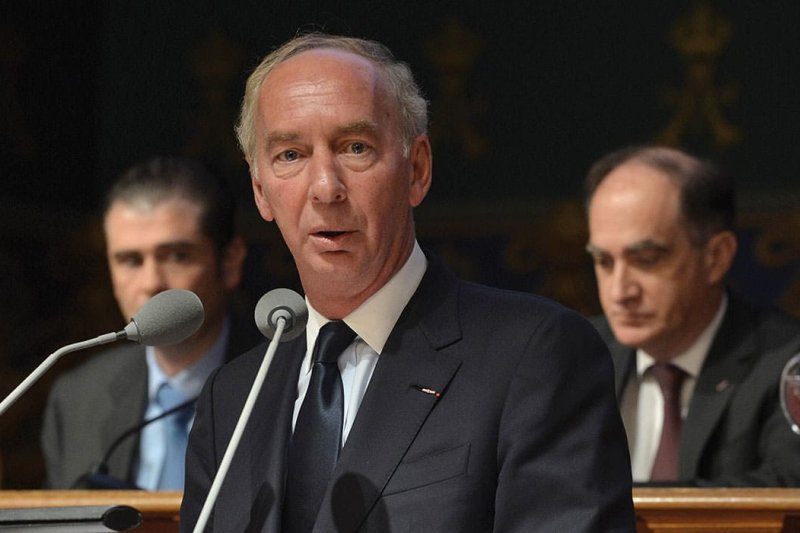'Thrilled with Albania’s Euro-enthusiasm'
“The campaign is particularly vivid this time because there is a lot at stake. Many existential questions are being debated that will determine Europe’s future prosperity and even its survival as a global player,” Jean-Dominique Giuliani, President of the Robert Schuman Foundation told Albanian Daily News in an exclusive interview focusing on the 2024 European Parliament election scheduled to be held on 6 to 9 June 2024.
According to President Giuliani, considering that the war is at Europe’s doorstep, the next legislature will also have to address the issue of a common European defense policy. “Europe needs to find its strategic voice in order to impose its weight on the global scene… This is why it is important that the European Union shows its strength in the face of Russian aggression and gives answers to Europeans who understand that this war is not only our Ukrainian neighbor’s issue, but that our European values and way of life are under attack.”
In a comment on his repeated call throughout the last years for a geostrategic Europe and the necessity to build it up and to strengthen it has been highlighted by several events, he referred to the Russian aggression in Ukraine, the threat European ships face in the Red Sea, the Suez Canal and the Strait of Hormuz, the war in the Middle East, the threat of cyber-attacks, etc…
In the meantime Mr. Giuliani said that Europe’s international position continues to be strongly challenged and Western Balkan countries play a crucial role in the continent's security.
Asked about the failure of Serbia to align itself with the European Union's foreign policy following the Russian aggression of Ukraine, he said that Belgrade held an ambiguous position. “Serbia continues to maintain strong relations with the Kremlin, with pro-Russian sentiment characterizing the majority of Serbian public opinion. Even after the invasion of Ukraine, 95% of Serbians still consider Russia as their country’s best ally, against 11% for the EU.”
Touching upon the fact that Albania whose population has the highest support for the EU enlargement President Giuliani said that he strongly believed in the virtues of enlargement for the EU. “And I'm thrilled to see that 77% of Albanians are Euro-enthusiastic, demonstrating their conviction in the benefits of the Union for their country. The opening of negotiations in July 2022 is fantastic news, and I encourage citizens to closely follow this process. It is a crucial moment where the candidate state must demonstrate legislative alignment with the EU. Though it may be lengthy and tedious, Euro-enthusiastic citizens must ensure that the procedure is duly conducted by their representatives. But I beseech the Albanian government to continue to fight more resolutely in favor of the Rule of Law, the European Etat de droit!” said Mr. Jean-Dominique Giuliani, President of the Robert Schuman Foundation in the following interview:
Albanian Daily News: First of all, Albanian Daily News welcomes you as one of the most authoritarian political figures contributing with talks and articles to our newspaper. On top of all Mr. Giuliani, which are your expectations from the 2024 European Parliament election scheduled to be held on 6 to 9 June 2024. The 'fever' of the campaign has become more vivid throughout the EU members than ever before. Which are some of the major reasons that make it so?
President Giuliani: The campaign is particularly vivid this time because there is a lot at stake. Many existential questions are being debated that will determine Europe’s future prosperity and even its survival as a global player. The European Union’s environmental commitments and regulations, although ambitious, face criticism for being excessive, particularly from sectors such as agriculture. They risk isolating Europe and jeopardizing its competitiveness, so they need to be adapted to today’s global realities. Additionally, with the end of Europe's period of economic growth, the new European legislature will need to foster innovation and economic growth. This is necessary in order to remain competitive on a global scene where demographic shifts are leading to different global power dynamics. Europe also faces threats to its democratic model and values, mainly from authoritarian regimes like Russia or China. Considering the war at its doorstep, the next legislature will also have to address the issue of a common European defence policy. Europe needs to find its strategic voice in order to impose its weight on the global scene.
-According to a recent study of the Eurobarometer 88% of European citizens consider a social Europe important to them personally. In addition, 60% of respondents are aware of at least one recent key EU initiative to improve working and living conditions. In your view, which are some of the other hot issues linked with the rising tension worldwide being considered by Europeans which, of course, constitute a high threat for all the countries, including EU countries?
-Social issues are, of course, important ones for Europeans who have been widely concerned by high inflation rates and a difficult economic context. However, the latest standard Eurobarometer from November 2023 shows that Europeans feel mostly threatened by the war in Ukraine and they are concerned about the topic of immigration. This is why it is important that the European Union shows its strength in the face of Russian aggression and gives answers to Europeans who understand that this war is not only our Ukrainian neighbour’s issue, but that our European values and way of life are under attack. When it comes to the topic of migration, the European Union has responded by agreeing on a comprehensive new Pact on Migration and Asylum – made up of 10 legislative texts – which is necessary because only a coordinated and united approach will have positive effects in European migration management and integration of refugees.
- "Europe wants to be "geostrategic": the time has come!" This is what you pointed out a few weeks ago this year. Could you please give some motives of this appeal and do you expect that the upcoming elections could be guided by it for Europe to be "geostrategic". And you also have launched the appeal for a real revolution in Europe, which remains, according to you, the best asset for peace, provided it wakes up. According to your follow up, how much such ideas have been embraced by the political scene and turned into one topic of the elections?

-Yes, I have repeatedly called for a geostrategic Europe and throughout the last years the necessity to build it up and to strengthen it has been highlighted by several events: the Russian aggression in Ukraine, the threat European ships face in the Red Sea, the Suez Canal and the Strait of Hormuz, the war in the Middle East, the threat of cyber-attacks, etc… In his speech on Europe on the 25th of April, the French president Emmanuel Macron also repeated his strong wish for a Europe that is able to protect itself without counting too much on other partners that are less and less reliable. Many steps have already been taken since the beginning of the Russian full-scale invasion of Ukraine: 13 European sanctions packages have slowed down Russian advances, the European Union has adopted its Versailles agenda, and defence spending all over Europe has been scaled up. This is not enough, however, and European citizens demand more. This needs to be taken seriously throughout the European election campaign and notably by the European institutions after the elections.
- Mr. Giuliani, all eyes of the Western Balkan countries' traditional aspirants to join the EU are focused on the EP elections with mixed expectations. According to you, what should the WB countries expect from them and do you think that the EU 'fatigue' will be replaced by concrete actions towards enlargement. For the sake of the truth 'fatigue' is being felt even in WB countries. If the enlargement process is over delayed does the risk exist that they might turn their eyes on other strategic alternatives? The example of Serbia with its special 'brotherly' ties with Russia is an ample demonstration and following this line how come that EU countries continue to tolerate this stance of Belgrade?
-The Western Balkans have indeed high expectations for the forthcoming European Parliament elections and we are aware of that. They are hoping for concrete action in favor of the enlargement process following these elections. The European Union is committing itself more firmly to a strategic policy with the countries of the Western Balkans. In November 2023, the European Commission announced the creation of a €6 billion ‘growth plan’ prior to accession for the six candidate countries of the Western Balkans. Payments remain, of course, conditional on political and economic reforms in these countries, with a view to their accession to the European Union. Furthermore, the European Political Community (EPC) is working jointly with the Western Balkans, particularly on migration issues which is another sign that we want to get closer with our Western Balkans neighbors. Europe’s international position continues to be strongly challenged and Western Balkan countries play a crucial role in our continent’s security.
-In addition Serbia has aggravated stability in the WB, especially putting in deadlock the dialogue with Kosovo despite EU and US mediation. Does Russia continue to be a threat in such a situation for another target of its expansionist policy and do you think that the EU needs a wake - up call for the rising tensions in the WB?
-Serbia has indeed failed in truly aligning itself with the European Union's foreign policy. Following the Russian aggression of Ukraine, it held an ambiguous position. While it never applied the Union’s restrictive measures against Russia, it vocally supports Ukraine’s territorial integrity and made some advances towards stepping up its efforts to fight sanctions circumvention. However, Serbia continues to maintain strong relations with the Kremlin, with pro-Russian sentiment characterizing the majority of Serbian public opinion. Even after the invasion of Ukraine, 95% of Serbians still consider Russia as their country’s best ally, against 11% for the EU.
Russia is stepping up its efforts in reinforcing pro-Russian media and its disinformation campaigns, contributing to the erosion of pro-EU sentiment. Russia is afraid the Union will make it irrelevant in the region, seeing it as a war of influence. The Kremlin puts the Western Balkan region in the wider context of its contest against the European Union and the Western world. However, it is debatable whether Russia can truly propose a viable geopolitical alternative for the Western Balkans regarding the EU. With its aggression in Ukraine, Russia has clearly made a choice of alignments, tying itself more than ever to China, Iran, and North Korea, the axis of evil. Russian actions in the Western Balkans aim primarily at disrupting the region’s European aspirations.
-Mr. Giuliani, we met in Tirana some years ago. I don't know if you have come to Albania after that visit but anyway what could you say about the changes in this Balkan country, a country whose population has the highest support for the EU enlargement?
-I strongly believe in the virtues of enlargement for the EU. And I'm thrilled to see that 77% of Albanians are Euro-enthusiastic, demonstrating their conviction in the benefits of the Union for their country. The opening of negotiations in July 2022 is fantastic news, and I encourage citizens to closely follow this process. It is a crucial moment where the candidate state must demonstrate legislative alignment with the EU. Though it may be lengthy and tedious, Euro-enthusiastic citizens must ensure that the procedure is duly conducted by their representatives. But I beseech the Albanian government to continue to fight more resolutely in favour of the Rule of Law, the European Etat de droit!














